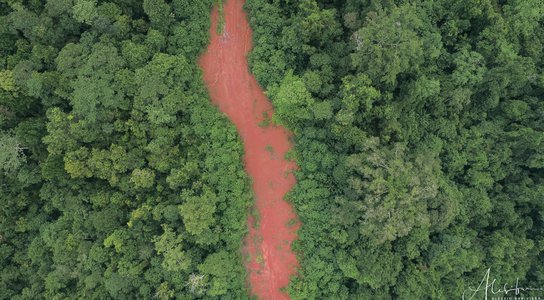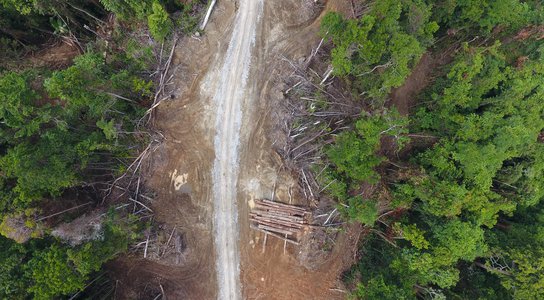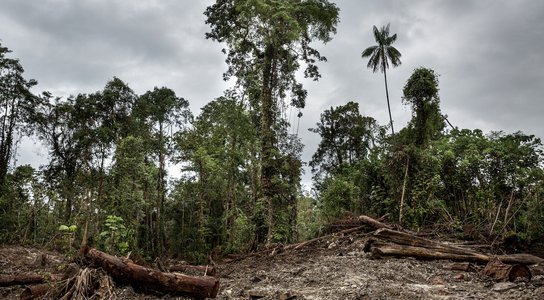Thursday 18th October, 2018 - New evidence released today by anti-corruption NGO Global Witness shows that hugely unsustainable rates of logging and the high risk of illegal practices on the once pristine paradise of the Solomon Islands are putting China’s reputation as a global trading partner at risk.
Using satellite imagery and drone photography, the Paradise Lost report highlights how the Solomon Islands’ tropical forests – often portrayed in travel magazines as ‘untouched’ – are being logged at nearly twenty times the sustainable rate, with Chinese companies alone importing twelve times more than is sustainable.
If this continues, the Solomon Islands’ natural forests are predicted to be commercially exhausted by 2036.
Despite being the largest importer of logs from the Solomon Islands, China requires no checks to ensure timber coming from the Islands or elsewhere is not illegally or unsustainably logged.
In 2017 alone, the Solomon Islands exported enough timber to fill Beijing’s Olympic stadium even though the entire country is less than twice the size of the Beijing municipality [1]. The small country is smothered in 12,613 km of logging roads: twice the length of the Yangtze River, one of the world’s longest rivers.
This small group of islands is China’s second biggest source of tropical logs, after Papua New Guinea (PNG) [2]. Together, Solomon Islands and PNG supply an astonishing 50% of China’s tropical log imports and we found widespread risk of illegality in both countries’ forest sectors
Timber from the Solomon Islands is at high risk of being illegal under its domestic laws. This makes purchasing it a commercial risk for Chinese companies and China’s major wood trading partners - including the US, UK, Japan, South Korea, Canada, Australia and the EU - all of which have laws in place that require companies to check that timber is legally harvested at source. The impact of this was seen in a recent $13 million fine of criminal charges to giant American flooring retailer, Lumber Liquidators, in relation to imports of flooring made in China using illegal wood.
The report published today reveals a high risk of illegal and exploitative practices by logging companies on the ground in the Solomon Islands.
The findings show that:
- There is a high risk that logging companies do not get the permission of local landowners to log in the way required by law;
- There is a high risk that companies log in prohibited places and harvest protected species;
- There is a high risk that companies do not pay the taxes they owe to the people of the Islands.
Global Witness is calling on China to put in place regulations requiring companies to carry out due diligence to check that timber is, at a minimum, legal in its country of harvest. It warns that if the practice carries on unchecked and this major carbon sink is lost, it will have disastrous and irreparable impacts on biodiversity and the global climate already being pushed to danger point.
Beibei Yin, Campaign Leader, Global Witness said:
“While the Solomon Islands are marketed as a pristine tropical idyll, our investigation shows that the reality is very different. The hugely unsustainable rate of logging, the high risks of illegality and the fact that the industry does little to benefit local people all create a bleak picture of islands far from unspoiled or unexploited.”
“While China is taking serious and positive steps to address environmental degradation and to reduce pollution and carbon emissions at home, it is overlooking an important aspect of its ecological footprint: the raw materials that it sources from abroad. If China continues to buy its wood with ‘no questions asked’ from the Solomon Islands it jeopardises its own business interests as well as efforts by its trading partners to improve governance, prevent environmental degradation, and mitigate climate change. It has the power and chance to make this change.”
Recommendations
In order to help curtail the issues of illegality and unsustainability revealed in the report, we recommend the following:
CHINA
- The
Chinese government should put in place mandatory measures requiring all
timber importers to carry out due diligence to ensure they do not import
timber produced in violation of source country laws.
- The Chinese government should expand its national Green Supply Chain policies to include requirements on the sourcing of timber and other raw materials abroad, by establishing mandatory requirement for these materials to be sourced legally.
SOLOMON ISLANDS
- The
Solomon Islands government should immediately place a moratorium on all
existing logging operations and review the issuance of their permits and
the operations themselves for legal violations. Permits found to have been
issued or operated illegally should be cancelled.
- Until
such time as a moratorium is imposed:
- The
Solomon Islands government should create a publicly accessible electronic
system of documents related to the issuance and oversight of logging
operations
- The
Solomon Islands should re-join the Extractive Industries Transparency
Initiative, extending the coverage to forestry
- The
Solomon Islands should employ an independent organisation or expert
company to verify the volumes, values and species of logs that are
exported in order to check that the logging companies are paying the
correct amount of taxes.
/ ENDS
Contacts
Notes to editor:
- In 2017, the Solomon Islands exported more than 3 million cubic metres of logs.
- In 2016, PNG provided 29% of China’s tropical log imports, making it the country’s single largest supplier, yet much of it is illegally sourced. See our report A Major Liability: Illegal logging in Papua New Guinea threatens China's timber sector and global reputation for more information.
- High quality, full colour drone footage, photographs and satellite imagery for this report can be found here.
- Video News Release for broadcast can be found here.
- Embargoed copy of the report available in English and Chinese on request.
- Interviews with Campaign Leader Beibei Yin are available on request. Please contact Heather Iqbal ([email protected] OR 00 44 7828 505 758) with any interview requests or for further information.
- About Global Witness: Global Witness investigates and campaigns to change the system by exposing the economic networks behind conflict, corruption and environmental destruction.
You might also like
-
Report Paradise Lost
At first glance, the Solomon Islands looks like a tropical paradise with palm-fringed white sand beaches and pristine, biodiverse rainforests. But look closer and the paradise isn’t so idyllic.
-
Report A Major Liability
As China continues to import huge volumes of timber from Papua New Guinea, its continued failure to regulate against illegally produced wood is putting its own reputation at risk.
-
Blog post Why I’m cautiously hopeful about China’s baby steps towards regulating timber imports
China may be heading in the right direction and joining a growing global community who prohibit illegal timber imports by law.